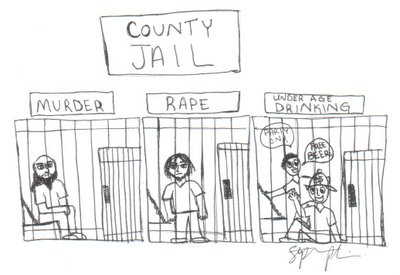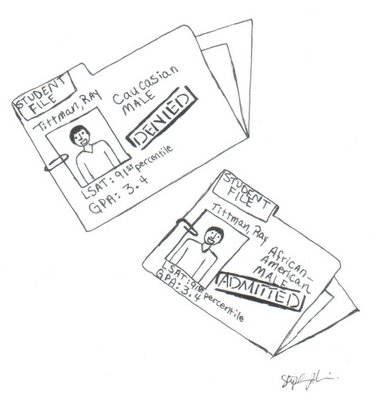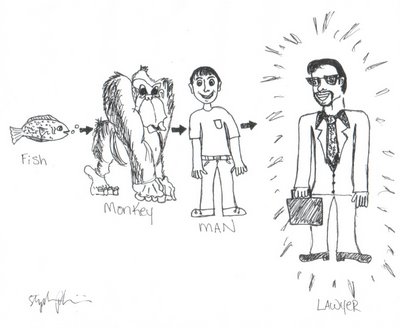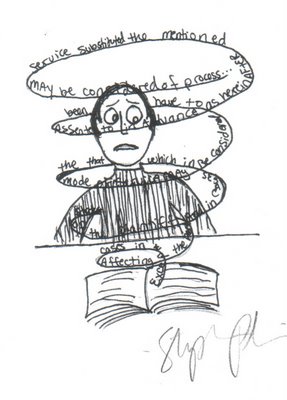
My fourth substantive class is
Torts. To be honest I have no idea what the word means. I wonder if other students share my ignorance.
Class begins with “I’m your instructor,
Charles Rice.” He’s looks like a military type: lean, perfect posture, white crew cut. His jaw, forehead, shoulders are angular and well-defined. Nothing weak about him. He’s wearing a blue cardigan, white shirt and tie, dress slacks.
On the whiteboard, Rice jots the telephone numbers at his office and home. “Call me any time,” he says.
"In accordance with my practice, I begin class with prayer. If you want, you may choose to join." Rice makes the sign of the cross. "Hail Mary, full of grace..." he mumbles. All around me students blend in and the chorus fills the room. At the end, Rice crosses himself again as do most of my classmates.
“The book is
Prosser,” he says. “You
will get it and you
will enjoy it.” Rice speaks in the staccato of a drill sergeant. “You must brief the cases. And you will be responsible for all the declarative statements of law in the book. You can't think about the law unless you know some.”
Rice turns from the podium to the whiteboard. “When you brief a case, start with the facts.” On the board he writes
FCTS. He points to the letters. “Abbreviate! Leave out the vowels. Later on in the semester, you can even leave off the consonants.”
The door opens and two students saunter in. Rice stops, upstaged for the moment. The stocky redhead in front slows down and whispers to the guy behind him. They both laugh like they’re drunk. Rice looks irritated as the latecomers settle in the front row. The redhead takes a noisy gulp of his Gatorade.
“Bottoms-up,” he says.
I’m in shock.
Rice steps forward and grabs the book off the top of redhead’s stack. He holds it up. It’s a bound paperback called
Casenote Legal Briefs.
“I don’t want to introduce a discordant note,” Rice says, “but the required text is Prosser. You are not to use canned briefs under any circumstance!”
The latecomers smirk.
Rice flings the paperback away from him like a frisbee. The pages flutter open and it hits the whiteboard with a thud.
I hear a gasp and a few laughs.
“Furthermore, this class begins at eleven hundred hours!” Rice’s voice is loud. “If you're not here at the start, you're not here!
Rice grabs both students by their shirt fronts and pulls them to a standing position. Then he pushes them up the aisle toward the door. The redhead trips and falls into the wall, hard.
“I think we have a battery.” Rice helps the student to his feet.
The back two rows of students stand up and begin clapping.
Rices waves them off. “You upperclassmen, get out of here.”
The rest of us realize we’ve been duped and applaud too. We laugh and talk to our neighbors while the room clears out.
“A little icebreaker to get your attention,” Rice says. “I don't care if you use briefs or an old outline. Bring anything you want to the class – audio, video. You can even bring a lawyer.”
Rice goes back to the board. “Now with the facts, don't just copy them out of the book. Distill them. Don't put in all kinds of trash. Train yourself to synthesize.”
He writes
QSTN and below it
HLDNG. “Phrase the question in terms of procedure or substance. Then answer it in the
holding.”
Next comes
RSNS. “At first your reasons are going to be wrong most of the time, but go ahead and try.”
He writes
PRNCPL.
“Last is the principle of the case,” Rice says. “For example, assault requires intent. This needs to be a capsule statement.”
Rice looks down at the thick black binder and then back at us. “Torts is the law of damages, injunctions, and personal injuries not looked at as crimes. But sometimes we so involved in the minutia that we forget the big picture.”
He points at a student. “Who are you?”
“
Mark Kromkowski.”
“Are you sure?”
The student nods. Kromkowski has dark hair, a poor shave, and heavy glasses too big for his face.
“Where’d you go to school?” Rice asks.
“Notre Dame.”
“Major?”
“Great Books.”
“Good,” Rice says. “Who makes laws?”
“Legislatures, courts, sometimes the executive branch.” Kromkowski is sweating and the glasses have slipped down a bit.
“Are you bound to obey the law?” Rice asks.
“Usually.”
“Usually?” Rice sounds incredulous. “What are you, an anarchist?”
Kromkowski shifts in discomfort and pushes his glasses back up.
“Suppose you’re working on the trial of East German border guards who shot countrymen trying to escape,” Rice says. “Their defense is ‘we were ordered to.’”
“I’d say they’re not bound,” Kromkowski answers.
“How about the trials after World War II for the German doctors who tested anti-coagulants by cutting off some poor guy’s arm. Their defense was that they were authorized and indeed required by the state.”
Rice is marching back and forth in front of us. “You have to address in your own mind whether you're going to adopt some form of
legal positivism or
natural law.” On the board he scribbles
LGL PSTVSM, then
NTRL LW. “It’s really an
epistemological question.”
Rice points to Kromkowski. “Can you really be sure of anything apart from sensory impression?”
“No.”
“Are you sure?” Rice asks.
“No.”
We laugh at how Kromkowski’s earlier answer has been used against him.
Rice shakes his head. “Every year I get one.”
Rice explains the differences between the points of view. “Legal positivists, like
Hans Kelsen who wrote the Austrian constitution, start with the basic premise that nobody can know what’s right or wrong. Nobody can say ‘what is justice.’ The
Nuremburg Laws of 1935 defined Jews as non-persons. Is that a valid law? A legal positivist would say, ‘Who knows?’”
Rice pauses.
“Natural law teaches that there's a divine concept of things. According to
St. Thomas... who by the way was a graduate of this school... natural law is implicit revelation. We see that everything has a nature and a purpose. The purpose of a car is to drive on land. So if you try to drive it from here to England, you can't. It's not in the car's nature to go underwater.”
Rice hasn’t glanced at his notes since he opened them. He’s looking straight at us and talking from the heart.
“Suppose Kromkowski is trying to decide whether to put oil or molasses into his car. You're his friend and say, ‘Oil.’ He says, ‘Who are you telling me what to do!?’ You say, “Look in the manual from the manufacturer.’ He says, ‘Who are they to push me around!?’”
We laugh. Even though the subject matter is serious, Rice’s tone is light.
“Whatever is in accord with the nature of the item is
good. In human beings, we know there are certain basic inclinations: to preserve self and the species, to live in community, and so on.”
Rice talks some about the use of reason and revelation, then finishes up. “Take a look at the perspective in
Veritas Splendor and
Evangelium Vitae. A person is created in the image of the Trinity to share eternity with God. It’s a life of relation and of self-giving. The model is Christ on the cross.”
Rice looks at his watch. By now it’s 12:15 p.m. “Thank you, Mr. Kromkowski, for your help today. You were outstanding.”
Rice turns to the rest of us. “I went through the philosophy so you can realize the law isn’t Droidsville. Don’t say, ‘I can’t make a decision about that stuff.’ Think and pray about it.” He shuts his binder. “Enjoy this place. It's a great law school.”
The class applauds, then we rush out for lunch.
* * *
 The absence of Professor Rice doesn’t mean I don’t think about Torts. The cases we would have covered deal with basic defenses to intentional torts such as battery, assault, and trespass.
The absence of Professor Rice doesn’t mean I don’t think about Torts. The cases we would have covered deal with basic defenses to intentional torts such as battery, assault, and trespass.


















